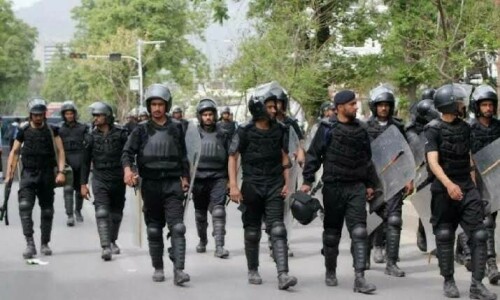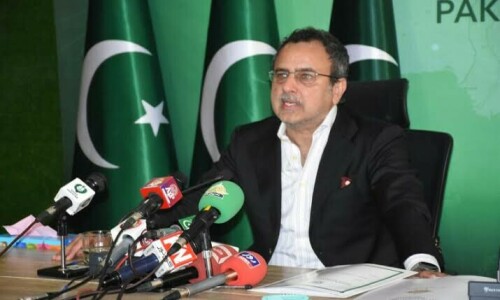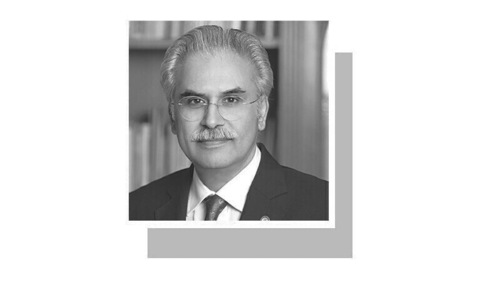 |
| On 15 October 1962, US President John F. Kennedy (right, in rocking chair) meets with Pakistani Foreign Minister Bogra (centre) and Ambassador Aziz Ahmed (left) at the White House. —Abbie Rowe. White House Photographs. John F. Kennedy Presidential Library and Museum, Boston. |
Mohammad Ali Bogra was serving as Pakistan's Ambassador to the United States when Governor-General Ghulam Mohammad nominated him Prime Minister. He succeeded Khawaja Nazimuddin, who had already been shown the door.
Bogra's nomination was widely rumoured to be the outcome of Washington's backing for him. Bogra also showed great deference to Ghulam Mohammad. A glimpse of his docility is found in Pakistan Kay Pehley Saat Wuzra-i-Azam, a book by Naeem Ahmed Khan et al. On page 73, under the heading ‘Pak-US Friendship; PM Drives Locomotive’, a passage reads:
“As a gesture of friendship, the United State gifted a few locomotives to Pakistan. The locomotives were to be received by the Governor-General in a formal ceremony. The Governor-General left in his car to the venue of the event, but Bogra chose to ride a motorcycle ahead of the car, acting as pilot rider. After they had arrived at the railway station where the locomotives were to be handed over to Pakistan, Bogra jumped onto an engine, wore a driver's cap, and started driving the locomotive for Ghulam Mohammed.”
Regardless of how unethically the Nazimudddin Ministry was axed, Bogra must have proven himself a suitable candidate to fill the prime minister's slot. His journey from a diplomat to a prime minister owes much to the way he conducted himself.
When Bogra headed the Pakistani diplomatic mission in the United States, his staff included a Lebanese women whose family had settled in Canada, from where Bogra knew her. Her name was Aliya, and she worked as his stenographer. After Bogra had been appointed Pakistan’s Ambassador to the United States, he had Aliya join him in Washington DC.
His association with Aliya did not end there. As soon as he became prime minister, Aliya Begum was re-designated as the Social Secretary to the Prime Minister of Pakistan. She would sit in the prime minister's room and read, for hours, all the files sent to the PM. They married soon after.
Bogra's first wife, Hameeda, would often vent her anger to Majeed, a footman of the PM House. Majeed claims that the older Mrs Bogra used to say, “We had hired her (the second wife of Mr Bogra). See, what she has done to us!”
Aliya Begum's marriage with Bogra was looked down upon by the other ladies of the ruling class. They feared that their husbands would follow suit by marrying more than one woman, and a new tradition of polygamy would take roots in the elites. Rafia Zakria writes on page 45 of her book The Upstairs Wife:
“The women started with the obvious: a boycott of all state functions at which the new, white first lady was invited. At the dinner parties to welcome foreign diplomats, the opening of a national university, the inauguration of a new wing of the Pakistan Secretariat, the presence of the interloping new Mrs Bogra would mean the absence of all other wives and daughters and mothers.
They were the hostesses of the Pakistan’s elite gatherings, and they correctly calculated that without them the men would be left without the oil to grease their rusty conversations and the twittering laughter for their bumbled jokes. They would be forced, the ladies reasoned to acknowledge Mr Bogra’s wrongdoing, and by extension the evils of polygamy. The social boycott would be the first step in their efforts to ban polygamy.”
The relationship between Mohammed Ali Bogra and Ghulam Mohammed went from good to bad very quickly; Bogra, who had once been riding the pilot motorcycle ahead of the Governor-General's car and driving the locomotive for him out of sheer deference, was asked to resign. Naturally, there must have been a whole chain of events which led affairs to this point.
The late military dictator – and as Shaikh Abdul Majid Sindhi puts it, self-proclaimed Field Marshal ‘without fighting a war’ – Ayub Khan writes on page 50 of his autobiography, Friends Not Masters:
“Mohammed Ali Bogra started as protégé of Ghulam Mohammed. As he acquired confidence, he thought he should disengage himself from the apronstrings of the Governor-General. People like Fazlur Rehman, Hashim Gazdar, and Abdus Sattar Pirzada encouraged him to assert himself. They would tell him that if he was not careful, he would meet the fate of his predecessors. They thought that the only answer was to curtail the powers of the Governor-General by amending the Indian Independence Act 1947.”
The plan was duly executed. Prime Minister Mohammed Ali Bogra and his cohorts had decided to get a resolution passed in the Constituent Assembly to this effect. Accordingly, after midnight, copies of the resolution were placed on the desks of all of the Assembly members. The proposed resolution annulled the Articles 9, 10, 10A 10B and 17 of the Indian Independence Act. It took only 10 minutes to vote the resolution into law.
Since then, Pakistan has enacted much of its other legislation with the same lightning speed, in the Bogra tradition.
By passing the resolution, Bogra and his cohorts made it clear to Governor-General Ghulam Mohammed that he no longer enjoyed the constitutional authority to dismiss any government at whim. Prime Minister Bogra, now a satisfied and pleased man, left on a visit to the United States, accompanied by Ayub Khan, Sir Zafarullah Khan, and Chaudhry Mohammad Ali. On the final leg of his foreign tour, he was scheduled to arrive in Canada. However, Bogra was still in the US when he received a message from Ghulam Mohammed to return home at once.
The message left him worried. Ayub Khan writes on pages 51-52 of his autobiography Friends Not Masters:
“At London airport, there was a telephone call for me from the Governor-General. I could not understand what he was saying and I gave the telephone to Iskander Mirza. All we could make out was that he wanted me to get back to Pakistan at once; he was not interested in the others. The Prime Minister was worried about what might happen to him on his return. It was with great difficulty that I persuaded him to accompany us back home....
“On the way, I told Iskander Mirza and Chaudhry Mohammad Ali that it would be extremely unwise if the Prime Minister was taken to the Governor-General immediately on our arrival in Karachi: such a confrontation could lead to an ugly situation... The Prime Minister should go to his own house and wait for a signal from us. Mohammad Ali Bogra put up a brave front, but I think, inwardly he was quite frightened. He had sent a message from London that he should be provided with army protection on arrival.... Iskander Mirza, Chaudhry Mohammad Ali and I went to the Governor-General’s house....
“The Governor-General ... was bursting with rage, emitting volleys of abuse, which, luckily no one understood. Chaudhry Mohammad Ali ventured to say something and received a volley; then Iskander Mirza said something and got another. We were pleading with him to give another chance to Mohammad Ali. His only reply was an angry growl, ‘Go, off you go.’ He kept on saying, ‘No, no.’ All he wanted was to shoo us off.
“We marched out of the bedroom in a single file, Iskander Mirza at the head, Chaudhry Mohammad Ali following, and I bringing up the rear. I was about to step out of the room when the nurse attending the Governor-General tugged at my coat. I turned and found myself facing a different man. There he was, the sick old Governor-General, who a moment ago was insane with anger, now beaming with delight and bubbling with laughter.
“I said in my heart, ‘You wicked old man!’ He beckoned me with a peculiar glee in his eyes, ‘Sit down on the bed.’ He then pulled out two documents from under his pillow. On one was written something to this effect: ‘I, Ghulam Mohammad, so and so, because of this, that and the other hand over such and such authority to General Ayub Khan and command him to proclaim a Constitution within three months.’
“I looked at that paper and said to myself, ‘Damn your soul. For the last eight years you have done damn all, and you expect me to produce a Constitution in three months.’ The other document was to the effect that I had accepted the offer, and for a brief moment I had those historic documents in my hand.
“As I looked at these pieces of paper, everything in me cried, ‘No’. I said: ‘You are being reckless and you will do the country immense harm. I am engaged in building up the army...’”
What is quite amazing, though, is that Ayub Khan in his autobiography frequently claims that he could not understand what Ghulam Mohammed said; this, he understood fully well.
He had arranged a meeting between Bogra and the Governor-General, but in the autobiography, he does not discuss the outcome of this meeting; the ink in his pen congeals before it could reveal the bitter truths from the past.
Pir Mohammed Ali Rashidi details the episode in Rodaad-i-Chaman, a collection of his columns. He has neatly arranged it into bullet points on page 127:
“A. In 1954, when Ghulam Mohammed and Bogra had a fight and Bogra left for the US, Ghulam Mohammed ordered Ayub Khan to follow him to America.
“B. On his return journey, Bogra was accompanied by Ayub Khan, who took him to Ghulam Mohammed, directly from the airport.
“C. When Ghulam Mohammed forced Bogra at gunpoint to dissolve the Constituent Assembly, Ayub Khan was among the “audience” (besides Chaudhry Mohammad Ali).
“D. Ghulam Mohammed not only coerced Bogra into dissolving the Constituent Assembly but also compelled him to appoint Ayub Khan as Defence Minister in the central cabinet (Ayub continued as the Commander-in-Chief of Pakistan Army, as well).”
A study of Pakistan's political history would reveal that most of the democratically elected rulers of the country were propped into power by dictators or bureaucracy, but once in office, these rulers realised that they could not blindly follow the eccentric dictators.
Thus, they refused to play second fiddle to them, but not without consequence; they were declared corrupt, opportunists, and traitors, and their governments were either dismissed or toppled.
Bogra met the same fate. His attempt to clip Ghulam Mohammed's powers backfired, and he lost his own wings.
Translated by Arif Anjum from the original in Urdu here.
Related:










































